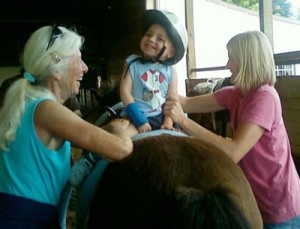Susanne Rosen believes in what a person can do given the proper instruction and lots of encouragement.
A visitor to the Adaptive Riding Institute, where Rosen is the executive director, is likely to encounter a rider wearing a beaming smile, escorted by spotters and an instructor leading the horse through a series of stops and turns.
It’s only upon closer scrutiny that the extra handles on the saddle or braces draw attention to a special need. The Adaptive Riding Institute provides fun and effective physical therapy for people with disabilities.
“Our original mission statement was that anyone could ride regardless of ability,” Rosen said. She purposefully does not say “regardless of disability.”
Rosen and the volunteers at ARI maintain an unrelenting focus on their clients’ potential and developing their abilities.
Rosen began the organization more than 20 years ago, after she developed equipment and specially trained a horse to accommodate her sister, Kerrill Knaus, who was wheelchair-bound with cerebral palsy. Rosen and Knaus decided to share what they had learned to benefit others with disabilities, so they too could enjoy horseback riding.
One of the beneficiaries of their pioneer work is 3-year-old Jordan McCarter of Silverton. Jordan had a stroke as a baby, resulting in partial paralysis and cerebral palsy. Until he started riding, his movement was limited.
Last year, when he was 2 years old, his occupational therapist from Easter Seals recommended horse therapy with ARI. His grandmother and caregiver, Cindy McCarter, decided it wouldn’t hurt to try.
The first thing she noticed after he began riding was an increase in her grandson’s mobility. He’s learned to scoot around, and has started babbling and learning words.
“It’s done wonders!” his grandmother said. “I would never have thought we would have gotten so much out of horse therapy.”
Joleen Magill’s 6-year-old daughter Josie, also from Silverton, has cerebral palsy with movement disorder. Like many others with cerebral palsy, Josie’s movements tend to be “floppy” because she lacks the motor control to sit up straight and hold up her head.
After three years of riding, Josie can now hold herself up in the saddle with a little help from a brace, and she keeps her head up for the entire riding session. She has even begun to use a few words such as “hi” and “go.”
“All the other therapists she goes to are amazed at how well she’s doing, and even the speech therapist attributes it to horseback riding,” Josie’s grandmother Colleen Boen of Mount Angel said.
ARI instructors try to complement their clients’ other physical therapies by working toward similar goals such as improved speech, balance or coordination.
Many young riders are blissfully ignorant of the goals because they have so much fun.
“[Riding] is one of the only therapies that we do with [Josie] that’s fun,” Magill said. “It’s an enjoyment for her. If you talk to her about riding or going to see a horse, she lights up and giggles.”
Rosen said research studies have proven the benefits of adaptive riding for people with disabilities, especially those with cerebral palsy. Riding helps relax tight muscles, strengthen the body’s core, and improve coordination and even cognitive functions.
Magill said she sees even immediate benefit from her grandaughter’s riding sessions. “After she rides, some of her movement disorders seem to dampen… She’s just happier, really easy-going.”
Self-sacrifice and compassion often mark the people who care for the disabled, Rosen said. “I get to meet some of the best parents and grandparents in the world.”
The feeling is mutual. The caregivers said Rosen and her staff are always accommodating and encouraging. McCarter said they go “beyond the call of duty.”
“You can tell that [the instructors] thoroughly love what they’re doing,”
Magill said.
Rosen is one of the instructors; the other is program director Carmen Hux, who traveled from her native Germany to volunteer with Rosen and improve her English. She planned to stay for nine months, but is now in her tenth year.
ARI has horses with a wide variety of sizes and temperaments so they can find a good fit for each client.
Riders develop a relationship with their mount by riding the same horse each week.
Boen said her granddaughter Josie “just loves her horse – it gives her that freedom to be out and about like a normal little child.”
Rosen boards ARI’s 16 horses at her ranch in Scotts Mills. Feeding and caring for a small herd of horses – not to mention pulling a large horse trailer from Scotts Mills to a Salem riding arena and back – demands resources greater than the $25 per lesson fee charged.
To make up the difference, ARI conducts fundraisers, drawing support from corporations, small businesses, foundations, and individuals. Rosen proudly noted that ARI does not receive any funding from government grants.
“We need a heated arena but we haven’t won the lottery yet,” Rosen said. Winter weather is too cold for most of her clients to ride.
Rosen would like for ARI to have a ranch somewhere between Silverton and Salem where it could operate its own arena on the same property with the horses. Right now, several arena owners, including Abiqua Country Estates, donate time to ARI for riding sessions.
ARI’s horses stay especially busy during the summer, when they work four days a week and sometimes are used for special riding trips to the beach or other places. In winter, the horses stay at home at Rosen’s ranch.
The riding season started in March, and horses are back working at Abiqua Country Estates, as well as in Salem.
“I’m really glad we have [a place to ride] so close to us,” Boen said.
“It’s a great opportunity for grandparent and grandchild to be together, just to see the smiles on their faces.”
